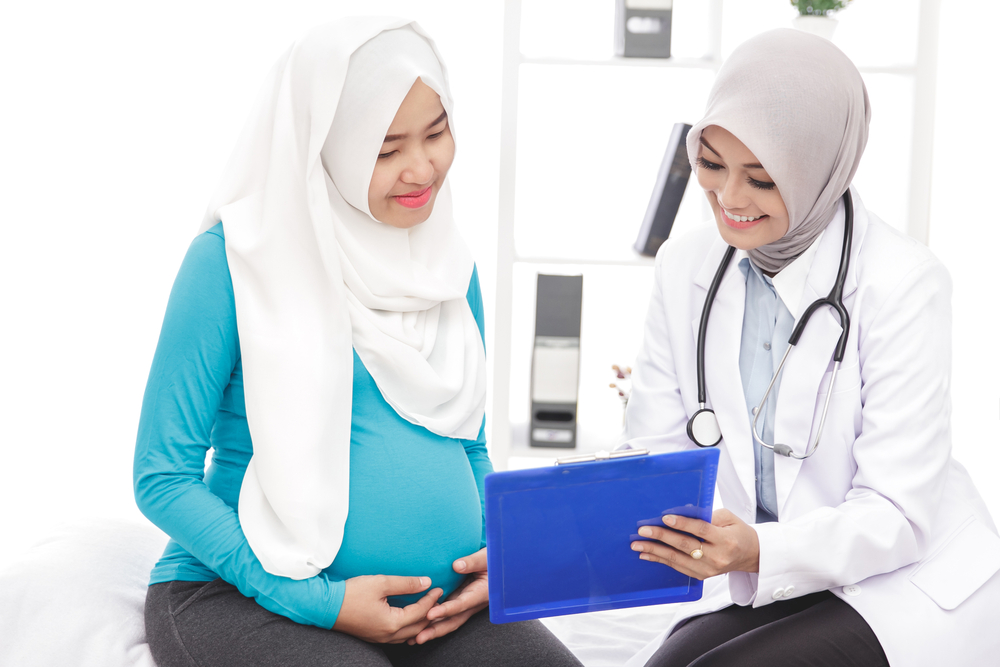Prenatal care is a good way to make sure that you and your unborn baby are healthy. Regular prenatal care:
- helps keep you and your unborn baby healthy.
- identifies and helps you address health concerns.
- lets you learn more about your growing baby and your changing body.
- gives you a chance to ask questions. You may find it helpful to come with your list of questions.
- helps you bond with your unborn baby.
- connects you with community services.
In Manitoba, health care is insured (paid for) through our medical system. A family physician, obstetrician or midwife can provide your prenatal care. Family physicians and midwives can provide care to you and your baby after birth. For more information see our page on finding a health care provider.
Your first visit – what to expect
You should have your first prenatal appointment between 10 and 14 weeks of pregnancy.
At this visit, your health care provider will:
- Ask you about your health and any medical conditions.
- Offer you a physical examination including checking your weight and blood pressure and Pap test if needed.
- Give you a form for lab tests. You will have a urine test to check for bacteria and a blood test to check for:
- anemia (low hemoglobin or iron levels, which can make you feel tired and weak)
- sexually transmitted infections including syphilis and HIV
- antibody levels for chickenpox, measles, mumps and rubella, hepatitis B
- blood type and Rh factor
- thyroid levels
How often will I have prenatal appointments?
- one a month until you are about 28 weeks pregnant
- then every two weeks between 28- 36 weeks of pregnanc
- then every week until you give birth
What to expect at all my prenatal appointments?
For every visit, you can expect to:
- have your blood pressure and weight taken.
- hear your baby’s heartbeat.
- have your belly measured to check that your baby is growing well.
What are other tests I should expect during my prenatal appointments?
Between 15-20 weeks of pregnancy:
- You will have another blood test (Maternal Serum Screening in Manitoba) which tests for Down’s syndrome, Trisomy 18, Trisomy 13 and open neural tube defects.
- You will have an ultrasound when you are 20 weeks pregnant to:
- check how your baby is growing and developing
- identify if there any problems
- check your amniotic fluid and placenta
- determine if you are carrying more than one baby
- confirm how many weeks pregnant you are (your due date may change based on this)
- check how active your baby is
- try to determine the sex of your unborn baby if you want to know. If you want to know the sex, they will write it in the report and your health care provider will tell you at your next appointment.
For more information check out Routine Tests – The Society of Obstetricians and Genecology

How to prepare for your ultrasound:
- wear loose fitting clothes
- do not pee before your ultrasound (you need a full bladder)
Note: A keepsake ultrasound may seem exciting and provide an opportunity see your unborn baby however, they are not recommended. The Society of Obstetricians and Gynaecologists of Canada, Health Canada and the Food and Drug Administration in the U.S., all recommend against the use of ultrasound to take pictures of your unborn baby for non-medical reasons. To read more about why it is not recommended click here.
At 24-28 weeks of pregnancy:
Pregnancy tip: be prepared to be at this appointment for a couple of hours

You will be offered a “glucose challenge test” which checks for diabetes in pregnancy (gestational diabetes).
This involves:
- consuming a high-sugar drink
- waiting for an hour
- having a blood test to see how your body responds to sugar
During the blood test they will also re-check for anemia, Rh status and sexually transmitted infections.
At 28-37 weeks of pregnancy:
You may need follow up care if your tests results show you have Rh negative blood and do not have antibodies for Rh factor. Your provider may give you an injection of RhoGAM at 28 weeks of pregnancy. This prevents a serious blood condition from developing in your baby.
- You will also receive a vaginal/anal swab to test for Group B Streptococcus (GBS) around 35 to 37 weeks.
- GBS is bacteria that are commonly found in the vagina and anus. It is not harmful to you but can be transferred to your baby during delivery and cause a serious infection. If you test positive for GBS, you will receive an intravenous antibiotic during labour.
- You will be tested again for sexually transmitted infections.
From 37 weeks until you deliver, you will see your health care provider weekly. For more prenatal information see: Babies Best Chance- 7th Edition Parents’ Handbook of Pregnancy and Baby Care.
What vaccines are recommended for pregnant people?
With each pregnancy, you should be immunized with Tdap (tetanus, diphtheria, pertussis) vaccine between 27 and 32 weeks. This protects your newborn baby particularly against pertussis (whooping cough) for the first few months of life.
COVID-19 and flu vaccines are also recommended at any stage in pregnancy. They are effective at reducing the risk of severe illness, hospitalization and death due to flu and COVID-19. The vaccines will also protect your baby once they are born. Visit Vaccine Finder – Government of Manitoba to find out where you can get your vaccine.


